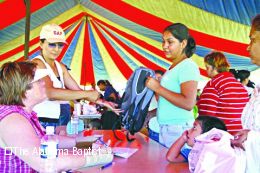An increase in gifts to the Southern Baptist World Hunger Fund for 1999 shows Baptists are committed not only to feeding the poor with bread, but also using the ministry as an evangelism tool, officials said.
Steve Nelson, director of hunger concerns with the Religious Liberty Commission (ERLC) of the Southern Baptist Convention (SBC), said gifts for 1999 totaled $10,732,302, the second highest to the fund in SBC history.
Pointing to an increase in giving, he said donations were up 2.8 percent from 1998 and increased by 60 percent from three years ago.
The goal for 2000 is $12.2 million, Nelson said.
“God is working in marvelous ways to prompt Southern Baptists to give selflessly for the Southern Baptist-directed hunger and relief ministries,” he said.
“Hunger ministry opens countless doors for sharing the good news of eternal life through Jesus Christ with those in need physically and spiritually,” he said. “The increased giving reveals that more and more Southern Baptists are gaining a passion for compassion regarding those who are less fortunate and hurting.”
Nelson said more than 10,000 decisions for Christ were made in the United States alone that were the result of ministries by the World Hunger Fund.
“That’s what the Baptist World Hunger Fund is all about — the Bread of Life, said Bob Reccord, president of the North American Mission Board (NAMB).
The World Hunger Fund is a combined effort of the International Mission Board (IMB), NAMB and the ERLC.
Nelson said IMB receives 80 percent of gifts to the World Hunger Fund with the remainder going to NAMB, unless otherwise designated by the giver.
Nelson said all gifts to the fund are used exclusively for ministry in North America and worldwide, Nelson explained, noting that nothing is taken from the fund’s proceeds for promotion or administration. Officials said operating costs for the World Hunger Fund are generated by other sources.
“To the best of my knowledge, the World Hunger Fund is the only hunger-related ministry that uses 100 percent of all gifts for hunger with nothing being taken out for administration and promotion,” Nelson said.
Nelson and others said simply feeding the poor and hungry is not enough, with the fund placing an emphasis on also feeding their souls.
The World Hunger Fund said more than 100 new churches were established in Honduras as of November 1999, following relief efforts after the area was devastated by flooding caused by Hurricane Mitch.
Other international success stories are relief efforts in Africa and Bosnia, where it is noted 3,000 families receive food and hear about the gospel in the latter country.
The importance of using opportunities to also witness can’t be ignored, said Richard Land, president of ERLC.
“There are those who think there are two gospels — one for spiritual ills and the other for social ills,” Land said. “To seek to feed the hungry and not tell them about the Bread of Life, that’s a denial of the gospel.”
ERLC points out disturbing facts about hunger throughout the world:
-Worldwide, there are 800 million people who are “chronically hungry.”
-The United Nations estimates that infection and malnutrition take the lives of 118,000 under the age of five each week.
But ERLC adds that hunger is not only a problem internationally, but also here in America. Reccord said the approximately 30 million Americans who experience “inadequate food supplies” each month offer an opportunity for lay people to minister to others not only in their own countries, but their own communities.
“Jesus made it very clear that ministry to people who are hurting is very close to His heart,” he said.
According to Reccord, more than 1.3 million Americans were fed by the Southern Baptist World Hunger Fund last year.
Addressing the possibility for growth of the fund, ERLC said world hunger gifts would increase eighteen-fold if every Southern Baptist gave one dollar each month.
“It is vital that more people adopt the spiritual discipline of gleaning, that is, small gifts given on a regular basis rather than just one time per year,” Nelson said. “This practice will raise Christians’ sensitivity to the needs of those around us while also making us more sensitive to the Holy Spirit.”
Mickey Caison, director of disaster relief ministries with NAMB, said “gleaning” is a major factor in the fund’s increase for 1999.
“We are seeing lives touched and changed as we share bread and the ‘Bread of Life’ or water and the ‘Living Water,’” he said.




Share with others: